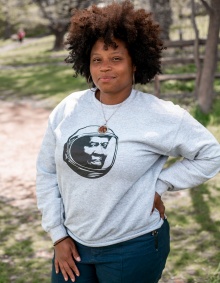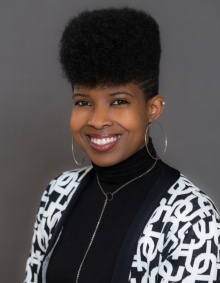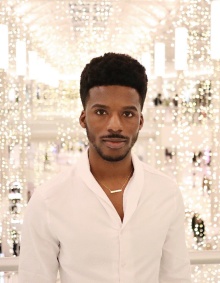Visiting Future Faculty Program (VITAL)
VITAL is an exciting and rewarding four-day program that brings promising doctoral scholars from all disciplines to the University at Buffalo.
VITAL seeks to contribute to the growth of faculty from traditionally underrepresented populations in the United States, particularly from Indigenous, African American/Black, and Hispanic/Latinx backgrounds. VITAL scholars have the opportunity to present their work, engage with UB faculty and students, meet other scholars in the program, and experience the region’s many offerings.
The School of Architecture and Planning was pleased to welcome three VITAL scholars to Buffalo in March 2022 as they considered UB as a landing place for their teaching and research pursuits.
Ashley Gripper, Phd Candidate, Environmental Epidemiology, Harvard University

Ashley Gripper
Ashley is an activist-scholar and current PhD Candidate in Environmental Epidemiology at Harvard University. Using spatial analysis and mixed methods, her dissertation explores the impact of urban agriculture on the mental health, spirituality, and collective agency of Black folks in Philadelphia. Ashley is a part of the Robert Wood Johnson Foundation’s Health Policy Research Scholars program and is learning how to translate research into policy that supports community wellbeing. She is an active member of Soil Generation, a Black and brown-led coalition of urban farmers, gardeners, and food justice activists. Ashley is the founder and director of Land Based Jawns, a spiritually rooted organization in Philly helping Black women and non-binary folks to reconnect and reunite with the land. Her organization provides education and training on natural agriculture, carpentry, self defense, and land-based living.
The racialized inequities we see in health, education, and income will continue to exist so long as there aren’t people from those communities in academic, decision-making, and policy-making positions. -Ashley Gripper
Ashley Gripper's goals as a VITAL Fellow
"The VITAL program will allow me to develop a range of mentors and collaborators with whom I can grow and learn. My work as a movement scholar will contribute diversity to the VITAL cohort by offering an alternative way to do academia. Over the past decade, I have been extremely active in food and land justice movements, expanded my advocacy work through policy, and strengthened the Harvard Chan School’s community engagement efforts through partnership development and research translation. I encourage my colleagues and stakeholders to expand how they conceptualize health, science, and knowledge to include community solutions to societal health problems.
The racialized inequities we see in health, education, and income will continue to exist so long as there aren’t people from those communities in academic, decision-making, and policy-making positions. I believe my community-based scholarship, background in organizing and policy, and demonstrated ability to effectively communicate rigorous scientific research would contribute a different and diverse perspective the VITAL cohort."
"My research is transdisciplinary and uses mixed methods to investigate the associations between urban agriculture, mental health, spirituality, and collective agency within Black communities. I designed and am the PI of a grant-funded, IRB-approved study that employs spatial, qualitative, epidemiologic, and psychometric methods to understand these impacts. My work highlights the historical and sociopolitical factors, such as structural and environmental racism, that have impacted and influenced Black agriculture in the United States. The first aim is a descriptive epidemiologic study assessing the association of neighborhood demographics with the number of community gardens at the block group level. This study shows that both Black and low-income neighborhoods have a greater concentration of community gardens compared to non-Black and higher income areas. This work serves as an introduction to the landscape of agriculture in Philadelphia and begins to lay the groundwork to understand how collective agency and community resistance might occur in the city’s Black and immigrant communities. The goal of my current research is to show City Council officials and the Mayor’s office how urban agriculture benefits the health of residents."
"The deep and longstanding relationships I have with my community partners have not only inspired my research questions and aims but have also shaped my approach to epidemiologic research. Community members who have demanded change, demanded anti-racist policies, and dedicated their lives to justice are the reasons we have seen more legislation that supports people at the margins of society. However, sustained racial justice and equity cannot be achieved unless those leading the research and advocacy efforts have deep connections to communities and deep understandings of nuanced oppression."
Bi'Anncha Andrews, PhD candidate, Urban and Regional Planning and Design, University of Maryland

Bi'Anncha T. Andrews
Bi’Anncha Andrews is a doctoral student in the Urban and Regional Planning and Design Program at the University of Maryland. Her research interests are focused on exploring the historic and present day impacts of displacement on vulnerable populations in gentrifying neighborhoods. More importantly, her work centers the critical roles that racism and sexism have played in shaping neighborhoods of concentrated disadvantage with limited access to effective social services and social safety. Bi’Anncha works as a graduate research assistant for Dr. Willow Lung-Amam and the National Center for Smart Growth (NCSG). In addition to her academic work, Bi’Anncha also works as a front line, licensed Social Worker with the Compass Program at the Catholic Charities Archdiocese of Washington. The purpose of her work has been to have positive effect on the social and physical environment in which people live their lives, bridge the divide between academia and local neighborhood-based planning, and influence policy and practices that bring equity, access and enhancement to the quality of life found in low-income, communities of color.
Scholars of color continue to struggle with gaining entry-level and tenure-track positions in academia, even after achieving all of the necessary requirements. We are taught early on, that we must work twice as hard as everyone else in order to have a fraction of the opportunities afforded to us as those nearly guaranteed to students who are not of color. While many institutions deny this fact, the boldness and bravery of the University at Buffalo to highlight it as a priority presents an exciting opportunity for students such as myself.
-Bi'Anncha T. Andrews
Bi'Anncha Andrews' goals as a VITAL Fellow:
"From a very young age, it was evident that access to opportunity did not extend to neighborhoods that were similar to the ones where I lived. These conditions were a result of the intentional human and capital disinvestment prevalent in many poor areas in the South. Against all odds, I now sit at the table of scholarship, giving voice to experiences largely unknown and ignored in academia and in the world. With a unique combination of real-world and academic experience, I will increase the diversity of the 2022 VITAL cohort by shining light on the real-world struggles and successes of students of color who must navigate systems and institutions riddled with adversity while pursuing advanced degrees."
"Over the years, there has been a renewed interest in investing in historically distressed neighborhoods in the inner city. This economic escalation has contributed to increasing rates of displacement following redevelopment in forms commonly known as gentrification. As gentrification and displacement rapidly reshapes neighborhoods across the US, low-income, black single mothers are forced to grapple with the rising cost of housing, the physical transformation of their communities, and the intentional displacement of their own families to make way for more affluent households. While low-income, Black women are arguably the most vulnerable to the social and economic pressures that accompany gentrification; single, black mothers are understudies in gentrification scholarship hence knowledge about their vulnerability, and outcomes during and post displacement are unclear. In addition, few studies have considered the barriers that Black mothers face in accessing social services and informal social supports post-displacement. My dissertation research aims to fill an established evidence gap on gentrification and displacement including the impact that it has on single-family households; where families go post-displacement – and provides an in-depth outlook on the consequences associated with displacement and the residual trauma experienced by black women during the displacement process. The purpose of my research is to generate a body of evidence that will enable social service improvement, provide early intervention points that limit the number of vulnerable families forcefully displaced from their homes, and enable the development of urban planning policies and practices that fosters sustainability amongst individuals and households that are at-risk when new development occurs."
Rashad Williams, PhD candidate in Public Affairs, University of Minnesota, Humphrey School of Public Affairs

Rashad Williams
Rashad Akeem Williams is a PhD candidate studying black political thought and urban planning at the University of Minnesota’s Humphrey School of Public Affairs. His research and teaching explore the moral bases for corrective racial justice at the municipal level and the range of policies that might constitute reparations in the planning context. He holds a Master of Public Administration (Binghamton University, 2017) , an MS in Student Affairs Administration (Binghamton University, 2017) , and a BS in Communication Studies (State University of New York at Cortland, 2014).
The mission behind the VITAL program demonstrates that the University at Buffalo recognizes both the importance of research that critically engages the subject of social equity and that we have a duty to elevate the voices of our historically marginalized and underrepresented scholars of color.
-Rashad Williams
Rashad Williams' goals as a VITAL Fellow:
"As a Black scholar within the field of urban planning, and particularly as a scholar whose work has been profoundly shaped by the intellectual contributions of the forebearers of the Black Radical Tradition, I bring perspectives to the fields of urban affairs that have for too long been marginalized. My research and teaching critically engages what is elsewhere regarded as utopian thought and challenges students to think through the political implications and consequences of our conceptual tools insofar as they constrain or expand our normative prescriptions while also attending to questions of practicability."
"My research and teaching leverage oppositional social theory, particularly within the variegated areas of Black political thought, to satisfy three questions confronting the field of urban planning in particular, and perhaps the fields of urban affairs more generally. The first, which I regard as the ontological question, concerns the extent to which a serious confrontation with the intellectual contributions of the Black Radical Tradition requires a fundamental reordering of the concepts through which we narrate urban histories and processes in the United States. As I argue in my published works to date, for instance, the concepts of racial planning, the racial state, and racial capitalism might, in certain cases, more illuminatingly reveal connections between race, class, and urban planning than the standard, and somewhat obfuscatory, rational planning/ equity planning or efficiency/ equity model. The second question, which is normative in nature, concerns what can and should be done within urban contexts once we recognize the causal significance of white supremacy as a sociopolitical system and its enduring consequences for our primary areas of concern (urban inequalities in housing, environmental quality, transportation, wealth, policing and so on). In what is the first article on the subject of reparations within the field of urban planning, I have proposed that we begin to intellectually develop a tradition of reparative planning. Finally, the third question, which we might call pragmatic, concerns the evaluation of reparative planning as an unfolding movement across American municipalities and regions. "